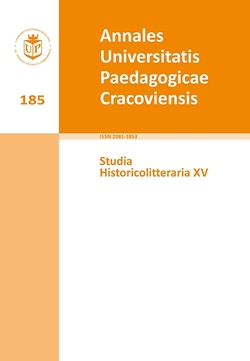Powstanie Warszawskie i obóz Durchgangslager 121 w Pruszkowie widziane oczami wysiedlonych mieszkańców Warszawy i okolic. Doświadczenia indywidualne a współczesna pamięć społeczna
Main Article Content
Abstrakt
Warsaw Uprising and Durchgangslager 121 in Pruszków as seen by deported citizens. Individual experiences vs contemporary public history
Warsaw Uprising 70th anniversary is a time to remember that the events which took place in 1944 should be considered in full context, without skipping any aspects. So far forgotten were the civilians of the Warsaw uprising and what happened to them; however their fate did not stop at the signing of capitulation. What people mainly remember from the Warsaw uprising is Durchgangslager 121 in Pruszków, the transition camp to which all the inhabitants of the burning capital city were sent. This paper presents and analyzes sample protocols, relationships, testimonies, memories and documented and archived diaries since August 1944 to today. The image emerging from them, even though the facts, people and events concur, isn’t a homogeneous one. It’s composed of many bits of memories - individual memories, collective memory, childhood memories, or the memories of the residents of particular neighborhoods in Warsaw. What characterizes these documents? When did they appear? What makes war narratives created over the period of 70 years different? How is the third generation’s contemporary collective memory being shaped? The attempt to answer these questions is the starting point for future large-scale interdisciplinary researches.
Key words: The Warsaw uprising; deportation of the people of Warsaw; transition camp Durchgangslager (Dulag) 121 in Pruszków; historical memory; war memories;
Downloads
Article Details

Utwór dostępny jest na licencji Creative Commons Uznanie autorstwa – Użycie niekomercyjne – Bez utworów zależnych 4.0 Międzynarodowe.
POLITYKA PRAW AUTORSKICH
Wydawca „Annales Universitatis Paedagogicae Cracoviensis. Studia Historicolitteraria” jest upoważniony do korzystania oraz do rozpowszechniana wszystkich opublikowanych w czasopiśmie materiałów na podstawie umowy licencji niewyłącznej, zawartej uprzednio na czas nieoznaczony każdorazowo z autorem/ką konkretnego utworu na określonych w tamtejszej umowie polach eksploatacji.
POLITYKA OTWARTEGO DOSTĘPU
„Annales Universitatis Paedagogicae Cracoviensis. Studia Historicolitteraria” to czasopismo o otwartym dostępie, a cała jego zawartość jest dostępna bezpłatnie dla użytkowników i instytucji na zasadach licencji niewyłącznej CreativeCommons (CC BY-NC-ND 4.0). Użytkownicy/ki mogą czytać, pobierać, wykonywać kopie, rozpowszechniać, drukować, wyszukiwać lub linkować do pełnych tekstów artykułów w tym czasopiśmie bez uprzedniej zgody wydawcy lub autora/ki pod warunkiem podania źródła dostępu i autorstwa danej publikacji. Jest to zgodne z definicją otwartego dostępu BOAI (http://www.soros.org/openaccess).
Bibliografia
Exodus Warszawy. Ludzie i miasto po Powstaniu 1944, red. E. Borecka, M. M. Drozdowski, J. Górski, J. Kazimierski, Warszawa 1992.
Majewska-Luft B., Gdy stanął czas dla Warszawy, „Przegląd Pruszkowski” 1994, nr 2.
Serwański E., Dulag 121 – Pruszków. Sierpień – październik 1944 roku, Poznań 1946.
Sławińska D., Kiedy kłamstwo było cnotą. Wspomnienia z pracy w obozie przejściowym w Pruszkowie 2 IX 1944–16 I 1945, Białystok 2006.
Wypędzeni z Warszawy 1944. Losy dzieci, red. I. Maliszewska, Warszawa 2007.
Zaborski Z., Durchgangslager 121. Niemiecka zbrodnia specjalna, Pruszków 2010.
Zbrodnia niemiecka w Warszawie 1944 r. Zeznania – zdjęcia, red. E. Serwański, I. Trawińska, Poznań 1946.
Netografia
Boenisch M., To, co łatwe do zobaczenia, dulag121.pl, www.dulag121.pl/index.php?cmd=aktualnosci&opt=pokaz&id=203 [dostęp: 30.11.2014].
Bojarska K., Obcy w „Tworkach”, obcy w „Achtung Zelig” – próba rekonstrukcji strategii literackich i wizualnych w kontekście Zagłady i post-pamięci, badanialiterackie.pl, www.badanialiterackie.pl/obcy/103-111_Bojarska.pdf [dostęp: 19.05.2013].
Wykresy
Praga A., autorskie badania ankietowe młodzieży z kwietnia 2011 r. i października 2014 r.
